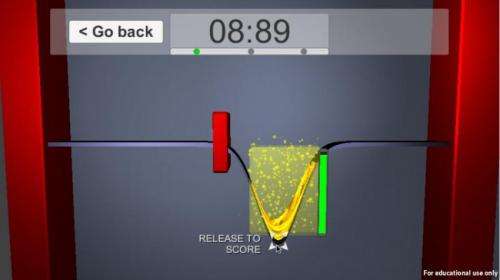Atlas of thoughts

Using a computer game, a research group at Aarhus University has found a way to gain deeper insight into the human thought process. The results have amazed the research director, who has discovered a kind of 'atlas of thoughts.' And that is not all. The group can also reveal which gender is best at solving quantum problems.
Are humans born with the ability to solve problems or is it something we learn along the way? A research group at the Department of Physics and Astronomy, Aarhus University, is working to find answers to this question.
The research group has developed a computer game called Quantum Moves, which has been played 400,000 times by ordinary people. This has provided unique and deep insight into the human brain's ability to solve problems. The game involves moving atoms around on the screen and scoring points by finding the best way to do so.
In this way, ordinary people contribute to quantum physics research. Associate Professor Jacob Sherson, director of the research group, explains that a player's ability to make a strategy and solve a problem is markedly different from the way a computer works. Based on 400,000 game solutions, he can make a start on compiling the results.
"We're very grateful that the game has been so well received. We've seen that the players were surprisingly good at solving the problems we raised in the game. We saw, for instance, a player with only knowledge of ninth-grade physics who solved a quantum physics problem that you would normally need a PhD in physics just to understand. The game has proved to be a very effective way to map the human thought process," he says.
The aim of Quantum Moves was to develop a game that could help the researchers look for new ways to develop quantum computers by providing them with insight into the thoughts of a person as opposed to the process in a computer.
"The players showed us that there's an unexploited capacity for ingenuity in the human brain. We see solutions that a computer would never have allowed, and which optimise the processes," says Associate Professor Sherson.
Boys versus girls
The group is not yet ready to make a conclusion about the balance of power between man and machine, but one thing they can already say in a clear voice is that females were better at solving problems than males. The results were recently published in the prestigious journal Human Computation.
"We can somewhat poetically say that there's possibly a special kind of female intuition that unfolds before our eyes in the game, compared with a caricature of a male approach that's more risky and action-oriented," says Andreas Lieberoth, who is a games psychologist and first author of the article, and a member of the group at Aarhus University. "It's a wild hypothesis that we'd like to test further," he adds.
This new insight into the human thought process will now form the basis for a new game launched by the group at Aarhus University, known as the AU Ideas Centre for Community Driven Research - or CODER for short. The game is called Quantum Minds, and aims to clarify how the human brain goes about solving a problem.
"It would be very interesting to find that the feminine brain has a different - and more efficient - approach than the masculine one. Can we use the new game to map the underlying factors? This is what we're hoping for," explains Associate Professor Sherson.
The new game was developed in collaboration between CODER and the Max Planck Institute for Human Development in Berlin, where Predoctoral Fellow Jana Jarecki is taking part with a focus on the cognitive aspects of the game.
"This game can contribute to creating an understanding of our cognitive processes. It's a wonderful opportunity for us to create a basic understanding of how human learning works," she says.
The joy of oblivion!
One of the major theses behind the new game is that humans are blessed with the ability to disregard irrelevant things in a problem and focus on the solution. This is where a computer is not quite as sharp because it is unable to ignore even the most obscure details, and will always include them in the work solving the problem. In other words, it is an advantage for humans that we are able to forget.
"We presumably manage to separate whatever is of no importance in relation to a given problem. We hope to transfer this to the work with quantum computers, where the behaviour of atoms is the crucial factor. If we can teach a computer to behave a little more like us, we could use this in new experimental set-ups here at the Department of Physics and Astronomy," says Associate Professor Sherson.
The games also represent a new trend that the research group hopes to develop further - user-involved research.
"By trying out the games, the players contribute directly to revolutionary new knowledge. In addition to gaining new insight, we are laying the foundations for the virtual university, where 'ordinary' people from all over the world can contribute to scientific research. The quantum games are a large step in this direction, and we now hope that lots of people will want to play and help us create a more detailed atlas of thoughts," concludes Associate Professor Sherson.
More information: The game Quantum Minds has just been launched and is now available to the public to play. Everyone is welcome to join in and contribute to the research by playing Quantum Minds
Provided by Aarhus University



















